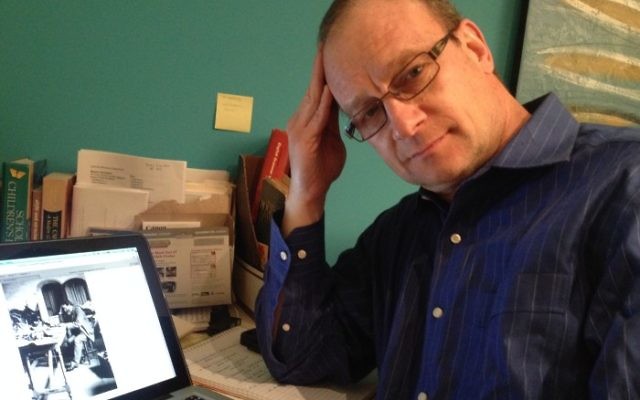‘Refuge’ A Story of Hate and Redemption
Tens of thousands of refugees from dozens of countries have begun new lives in America in Clarkston, Ga.
Over the past 40-plus years, tens of thousands of refugees from dozens of countries have begun new lives in America in Clarkston, Georgia, often referred to as “the most diverse square mile in the United States” and “the Ellis Island of the South.”
Heval Kelli, a Kurdish Muslim whose family fled Syrian oppression, arrived as an 18-year-old, two weeks after 9/11. He found work washing dishes at a restaurant a block from the Emory University Hospital.
After graduating from Georgia State University and the Morehouse School of Medicine, Dr. Heval Kelli completed his residency and a cardiology fellowship — at the Emory University Hospital. He now practices at the Northside Hospital Cardiovascular Institute. His wife, Dr. Kazeen Abdullah, a Kurdish refugee who came to America as an 8-year-old, is also a cardiologist.
Chris Buckley is a heavily tattooed veteran who lives in LaFayette, Georgia, 110 miles northwest of Clarkston, with his wife, Melissa, and their son and daughter.
Buckley learned to hate during a rough childhood and adolescence in in Cleveland, Ohio.
He traces his loathing of Muslims to 9/11 and deployments to Iraq and Afghanistan during 13 years in the Army. Buckley left the military after breaking his back in a Humvee accident. Hate drove him to become a Grand Nighthawk of the Georgia White Knights of the Ku Klux Klan. PTSD (post-traumatic stress disorder) and physical pain led to abuse of opioids, cocaine, mushrooms, and methamphetamine.
The story of how Kelli met Buckley and the friendship that developed runs through the documentary “Refuge,” awarded “Best Georgia Feature” and the audience award for best feature at the recent Atlanta Film Festival. A week-long screening of the film, now eligible for Oscar consideration as a documentary feature, is planned at the Plaza Theater in Atlanta.
“Refuge” was directed and produced by Atlantans Erin Levin Bernhardt and Din Blankenship, both 2007 graduates of the University of Virginia. The impetus for the film was the August 2017 “Unite the Right” rally, in Charlottesville, Virginia.
One lasting image from that weekend was the nighttime march through the UVA campus by hundreds of mostly khaki- and polo shirt-clad men, carrying lighted torches, and chanting “Jews will not replace us” and “white lives matter.”
Another was video of an avowed neo-Nazi driving a car into people walking away from the downtown area where bigots of various stripes had clashed with counterdemonstrators. One woman was killed, and dozens of people were injured.
Bernhardt and Blankenship originally intended to focus on Clarkston’s refugee population.
“I wanted to make a film about the opposite of hate and Clarkston was the perfect example of that,” a city where refugees from homelands “literally at war with each other choose deliberately to live with each other,” Bernhardt said.
Bernhardt, whose family has a six-generation history at the Ahavath Achim Synagogue, said, “I think that anything that counters hate should be considered Jewish.” The message of the Holocaust may be “never again,” she said, “yet here we are, letting things happen again, and again, and again.”
Six months into work on the film — initially titled “Clarkston: Mother of Exiles” — Kelli invited the filmmakers along on his first visit to Buckley. The narrative changed, as Clarkston and its immigrant population became the backdrop for a story about the power of interaction with the “other.”
Two women also feature in “Refuge.” One is Melissa Buckley, whose resolve set her husband and their family on a different path. Bernhardt calls her “the real hero of the story.” The other is Amina Osman, a beloved 92-year-old survivor of a massacre in her native Somalia, known as “Mama Amina” and the “mother of Clarkston.”
Bernhardt served as a Peace Corps volunteer in Madagascar and worked for three years as a writer and producer at CNN, before producing her first independent documentary “IMBA Means Sing,” about the African Children’s Choir. After Charlottesville, she left her job as engagement director at the Points of Light Foundation and began work on the project that became “Refuge.” A year was lost to COVID before the film was finished last November. Bernhardt now works as a digital content producer for Children’s Healthcare of Atlanta.
The Torah tells the Jewish people at least 36 times that they are to welcome and care for the stranger. “Refuge” is 75 compelling minutes that should resonate with the Jewish community, particularly at a time of proliferating expressions of hate. Synagogues, schools, or other groups interested in arranging a screening can go to refugemovie.com and click on the contact link.
- From Where I Sit
- Dave Schechter
- Refugees
- Clarkston
- Ellis Island of the South
- Heval Kelli
- Kurdish Muslim
- Syria
- Emory University Hospital
- Georgia state university
- Morehouse School of Medicine
- Northside Hospital Cardiovascular Institute
- Dr. Kazeen Abdullah
- LaFayette
- Chris Buckley
- Cleveland
- Grand Nighthawk
- Georgia White Knights
- Ku Klux Klan
- PTSD
- Opioids
- cocaine
- mushrooms
- methamphetamine
- documentary
- Atlanta Film Festival
- Oscars
- Academy Awards
- Plaza Theater
- Erin Levin Bernhardt
- Din Blankenship
- Ahavath Achim Synagogue




comments